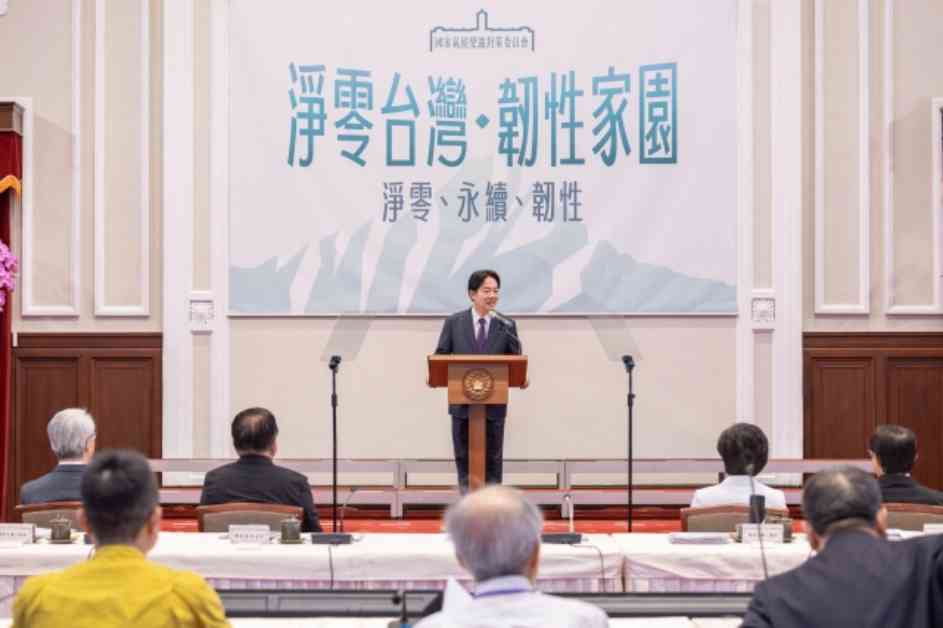Taiwan’s Climate Action: A Global Opportunity
Taiwan’s proactive stance on climate change has positioned the island nation as a key player in global efforts to address the climate crisis. Despite not being a member of the United Nations Framework Convention on Climate Change (UNFCCC), Taiwan has voluntarily submitted its nationally determined commitments for over a decade. In a significant move in 2023, the Tsai administration enshrined Taiwan’s 2050 net-zero target into law, demonstrating a firm commitment to reducing greenhouse gas emissions. Additionally, the Ministry of Economic Affairs announced a target for 20% of energy generation to come from renewable sources by 2025, highlighting Taiwan’s transition towards a more sustainable energy mix.
Importance of Taiwan’s Energy Transition
Taiwan’s energy transition is not only critical for global decarbonization efforts but also holds strategic importance due to the country’s dominance in the semiconductor industry. As Taiwan relies heavily on imports of natural gas and coal, reducing its dependence on fossil fuels is crucial for both environmental sustainability and national security. The vulnerability of Taiwan’s energy supply chain to naval blockades underscores the urgent need for diversification towards renewable energy sources. Furthermore, Taiwan’s per capita CO2 emissions, which are more than double that of the UK, highlight the pressing need for ambitious climate action to mitigate the impacts of the climate crisis, such as disrupted typhoon cycles and rising sea levels.
Motivations for Taiwan’s Voluntary Alignment with International Climate Regime
Despite its exclusion from official UN climate processes, Taiwan’s voluntary alignment with the international climate regime is motivated by a desire for international support and recognition. Through climate bandwagoning, Taiwan strategically links climate change politics to its broader political aims, seeking increased legitimacy on the global stage. Taiwan’s climate diplomacy efforts aim to position the country as a responsible eco-citizen and strengthen its relationships with the international community. By leveraging climate change as a platform for greater UN participation, Taiwan has sought to elevate its global standing and enhance its diplomatic outreach. The country’s support for climate adaptation in vulnerable small island states, such as the Marshall Islands, Nauru, Palau, and Tuvalu, underscores Taiwan’s commitment to addressing climate change on a global scale.
President Lai’s Continued Focus on Climate Diplomacy
President Lai’s administration has signaled a continued emphasis on climate issues as a key component of Taiwan’s diplomatic relationships. By highlighting climate change as an area of cooperation with Europe, President Lai aims to strengthen economic and trade ties while addressing shared global challenges. Taiwan’s proactive stance on climate action under President Lai’s leadership underscores the country’s commitment to sustainable development and international cooperation.
Challenges and Opportunities in Taiwan’s Climate Diplomacy
Despite Taiwan’s impressive climate commitments, challenges persist in translating these commitments into effective governance and tangible results. Criticisms of Taiwan’s climate legislation as a “gesture policy” reflect concerns about insufficient policy implementation and ineffective governance. While Taiwan has made strides in areas such as offshore wind energy, policy shortcomings and low carbon taxes have raised doubts about the country’s ability to achieve its climate targets. A renewed focus on effective climate governance and tangible action is essential for Taiwan to garner meaningful international recognition for its climate efforts.
Synergies Between Climate Diplomacy and Taiwan’s Success in Other Issue-Based Diplomacy
Taiwan’s success in issue-based diplomacy, such as LGBT rights promotion and healthcare diplomacy, offers valuable lessons for enhancing its climate diplomacy efforts. By aligning climate action with other successful diplomatic initiatives, Taiwan can differentiate itself in the global arena and attract greater international support. Leveraging its strengths in healthcare, technology, and democratic governance, Taiwan can position itself as a leader in climate justice, innovation, and inclusivity. By adopting a holistic approach to climate diplomacy that integrates diverse perspectives and expertise, Taiwan can effectively engage with the international community and address the urgent challenges posed by climate change.
China’s Influence on Taiwan’s Climate Diplomacy
China’s emergence as a climate leader presents both challenges and opportunities for Taiwan’s climate diplomacy efforts. While China’s investments in renewable energy technologies have positioned it as a key player in international climate negotiations, criticisms of China’s climate commitments highlight opportunities for Taiwan to differentiate itself. By focusing on areas where Taiwan excels, such as healthcare, technology innovation, and democratic governance, Taiwan can carve out a unique role in global climate diplomacy. By emphasizing its strengths and contributions to climate action, Taiwan can overcome barriers to international recognition and advance its climate goals on the world stage.
Conclusion
Taiwan’s proactive stance on climate action presents a unique opportunity for the country to play a significant role in global efforts to address the climate crisis. By aligning its climate diplomacy with its broader political aims and leveraging its strengths in technology, innovation, and democratic governance, Taiwan can enhance its international standing and contribute meaningfully to the fight against climate change. Through effective governance, tangible action, and strategic partnerships, Taiwan can position itself as a leader in climate diplomacy and drive stronger climate action both domestically and internationally.












